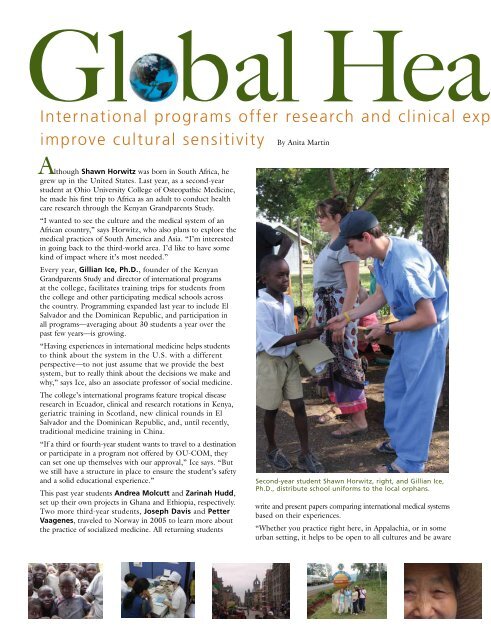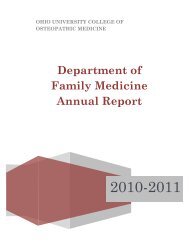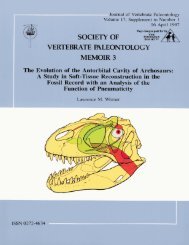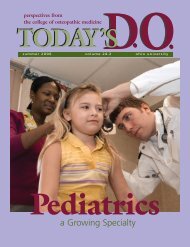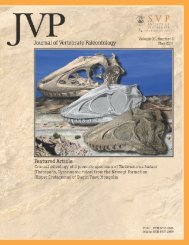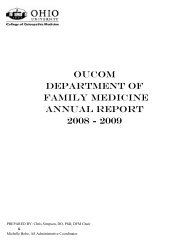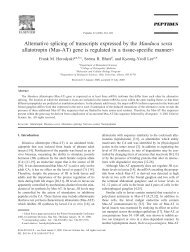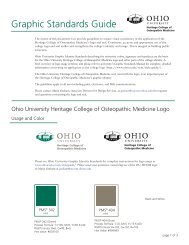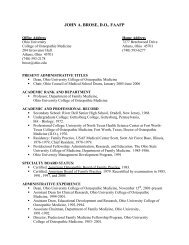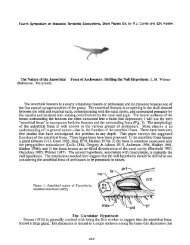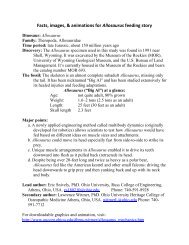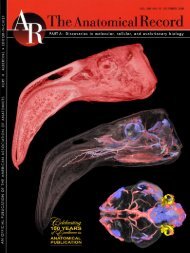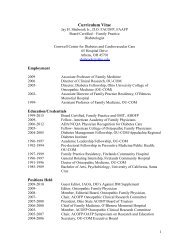DO - Ohio University College of Osteopathic Medicine
DO - Ohio University College of Osteopathic Medicine
DO - Ohio University College of Osteopathic Medicine
Create successful ePaper yourself
Turn your PDF publications into a flip-book with our unique Google optimized e-Paper software.
Gl bal Hea<br />
International programs <strong>of</strong>fer research and clinical exp<br />
improve cultural sensitivity By Anita Martin<br />
A<br />
lthough Shawn Horwitz was born in South Africa, he<br />
grew up in the United States. Last year, as a second-year<br />
student at <strong>Ohio</strong> <strong>University</strong> <strong>College</strong> <strong>of</strong> <strong>Osteopathic</strong> <strong>Medicine</strong>,<br />
he made his first trip to Africa as an adult to conduct health<br />
care research through the Kenyan Grandparents Study.<br />
“I wanted to see the culture and the medical system <strong>of</strong> an<br />
African country,” says Horwitz, who also plans to explore the<br />
medical practices <strong>of</strong> South America and Asia. “I’m interested<br />
in going back to the third-world area. I’d like to have some<br />
kind <strong>of</strong> impact where it’s most needed.”<br />
Every year, Gillian Ice, Ph.D., founder <strong>of</strong> the Kenyan<br />
Grandparents Study and director <strong>of</strong> international programs<br />
at the college, facilitates training trips for students from<br />
the college and other participating medical schools across<br />
the country. Programming expanded last year to include El<br />
Salvador and the Dominican Republic, and participation in<br />
all programs—averaging about 30 students a year over the<br />
past few years—is growing.<br />
“Having experiences in international medicine helps students<br />
to think about the system in the U.S. with a different<br />
perspective—to not just assume that we provide the best<br />
system, but to really think about the decisions we make and<br />
why,” says Ice, also an associate pr<strong>of</strong>essor <strong>of</strong> social medicine.<br />
The college’s international programs feature tropical disease<br />
research in Ecuador, clinical and research rotations in Kenya,<br />
geriatric training in Scotland, new clinical rounds in El<br />
Salvador and the Dominican Republic, and, until recently,<br />
traditional medicine training in China.<br />
“If a third or fourth-year student wants to travel to a destination<br />
or participate in a program not <strong>of</strong>fered by OU-COM, they<br />
can set one up themselves with our approval,” Ice says. “But<br />
we still have a structure in place to ensure the student’s safety<br />
and a solid educational experience.”<br />
This past year students Andrea Molcutt and Zarinah Hudd,<br />
set up their own projects in Ghana and Ethiopia, respectively.<br />
Two more third-year students, Joseph Davis and Petter<br />
Vaagenes, traveled to Norway in 2005 to learn more about<br />
the practice <strong>of</strong> socialized medicine. All returning students<br />
Second-year student Shawn Horwitz, right, and Gillian Ice,<br />
Ph.D., distribute school uniforms to the local orphans.<br />
write and present papers comparing international medical systems<br />
based on their experiences.<br />
“Whether you practice right here, in Appalachia, or in some<br />
urban setting, it helps to be open to all cultures and be aware


